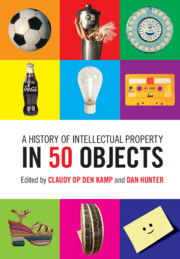Book contents
- Frontmatter
- Dedication
- Contents
- Acknowledgments
- Introduction: Of People, Places, and Parlance
- The Pre-Modern Period
- The Age of invention
- Modern Times
- The Consumption Age
- The Digital Now
- 39 Polymer Banknote
- 40 Post-it Note
- 41 Betamax
- 42 Escalator
- 43 3D Printer
- 44 CD
- 45 Internet
- 46 Wi-Fi Router
- 47 Viagra Pill
- 48 Qantas Skybed
- 49 Mike Tyson Tattoo
- 50 Bitcoin
- About The Contributors
50 - Bitcoin
from The Digital Now
Published online by Cambridge University Press: 12 June 2019
- Frontmatter
- Dedication
- Contents
- Acknowledgments
- Introduction: Of People, Places, and Parlance
- The Pre-Modern Period
- The Age of invention
- Modern Times
- The Consumption Age
- The Digital Now
- 39 Polymer Banknote
- 40 Post-it Note
- 41 Betamax
- 42 Escalator
- 43 3D Printer
- 44 CD
- 45 Internet
- 46 Wi-Fi Router
- 47 Viagra Pill
- 48 Qantas Skybed
- 49 Mike Tyson Tattoo
- 50 Bitcoin
- About The Contributors
Summary
ON 12 JANUARY 2009 a pseudonymous entity signed a transaction that instructed a distributed network to transfer a small amount of digital currency to Hal Finney, one ofthe key figures of the cypherpunk movement. After a few minutes, the transaction was recorded on a distributed public ledger, permanently updating the balance ofbothparties. This transaction— the first Bitcoin transaction—marked the beginning of a new era of decentralized payment systems, ushering in a variety of financial Services that do not depend on any centralized clearinghouse or other financial middleman.
Bitcoin is regarded by many as a powerful technological innovation that could disrupt many sectors, in the realm of finance and beyond. But the underlying technology on which the network operates, the Bitcoin blockchain can do much more than that. Just as the internet did in the early-1990s, blockchain technology carries with it a whole new range of promises concerning how decentralization can support and promote individual freedoms and autonomy. Blockchain proponents believe that Bitcoin and other cryptocurrency platforms will revolutionize mechanisms of value exchange in the same way that the internet transformed information sharing, by providing a platform for people to exchange digital resources, in a secure and decentralized manner without the need to rely on any intermediary or trusted authority. But this revolutionary potential also carries with it serious implications for censorship, intellectual property, and the regulated flow of information.
A blockchain is a decentralized database of transactions maintained by a distributed network of computers, which all contribute to the verification and the validation of transactions. Once accepted, these transactions are recorded inside a “block” of transactions, which incorporates a reference to previous blocks. This creates a long chain of blocks—a “blockchain”—that stores the history of all transactions in a chronological order. Every block contains information about a particular set of transactions, a reference to the preceding block in the blockchain, and the answer to a complex mathematical puzzle that is used to validate the data associated with that block. A copy of the blockchain is stored on every computer in the network, making it virtually impossible for anyone unilaterally to modify the data stored on this decentralized database: if anyone tries to modify any transaction the fraud will be immediately detected by all other network participants.
- Type
- Chapter
- Information
- A History of Intellectual Property in 50 Objects , pp. 408 - 416Publisher: Cambridge University PressPrint publication year: 2019
- 1
- Cited by

